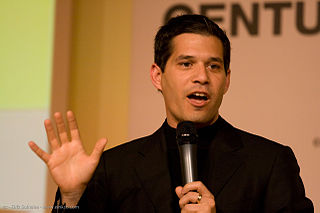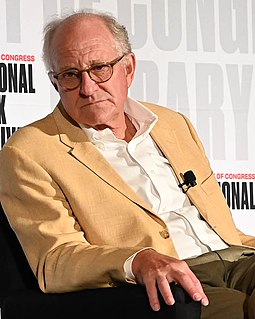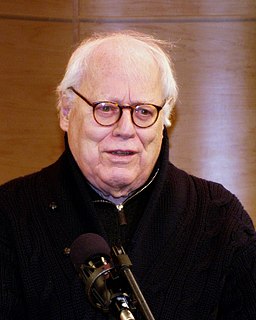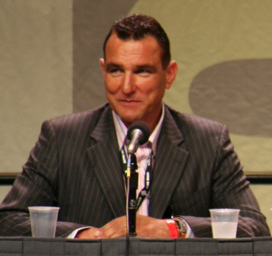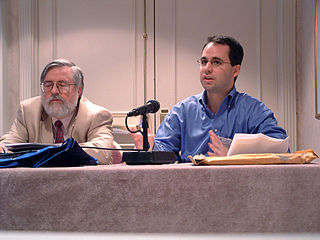Top 1200 Technological Change Quotes & Sayings - Page 2
Explore popular Technological Change quotes.
Last updated on April 21, 2025.
I don't. We've had three technological revolutions that have changed the course of human history, all driven by physics. In the first, the industrial revolution, physicists developed Newtonian mechanics and thermodynamics, which gave us the steam engine and machine power. The second technological revolution was the electricity revolution. That gave us radio, television, and telecommunications. Then, physicists developed the laser and the transistor.
When we first started Fear factory, we asked ourselves what Fear Factory means, it was a cool name, but what did it mean? We obviously embraced the technological side of a factory, as a factory can be anything from something that insights fear, like a government machine, to something of futuristic technology, or it could be religion. So we embraced the technological side of it back in the early days.
Maybe one thing that has happened is that the claims of non-partisanship of the mainstream media have been a little bit exploded. Mostly I'd say what, if anything has caused the change, are just the obvious technological changes - proliferation of easier access to getting your opinions out and the proliferation of media.
Web publishing can create common spaces; it all depends on how we, the readers and sometimes the producers, react to technological change. If we sort ourselves into narrow groups, common spaces will be in big trouble. But there's no reason not to have common spaces on the Internet. There are lots of them out there.
Engineering is not merely knowing and being knowledgeable, like a walking encyclopedia; engineering is not merely analysis; engineering is not merely the possession of the capacity to get elegant solutions to non-existent engineering problems; engineering is practicing the art of the organizing forces of technological change ... Engineers operate at the interface between science and society.
It is possible in theory and I think true in practice that centralization could have been the optimal solution at the beginning of the computer era and now, but not in between. And it may change back again with some other technological development. Some things move in a straight line. Others move like a pendulum.
During this period (of technological confinement / [and language]) the human mind has been placed in its narrowest confines it has experienced since consciousness emerged from its Paleolithic phase. Even the most primitive tribes have a larger vision of the universe, of our place and functioning within it, a vision that extends to celestial regions of space and to interior depths of the human in a manner far exceeding the parameters of our world of technological confinement.
Western society has accepted as unquestionable a technological imperative that is quite as arbitrary as the most primitive taboo: not merely the duty to foster invention and constantly to create technological novelties, but equally the duty to surrender to these novelties unconditionally, just because they are offered, without respect to their human consequences.
There has always been a longing in the human heart for a more just, free, loving and creative society. But it was never before possible to fulfill these aspirations, because we had neither the evolutionary drivers and global crises to force us to change, nor did we have the scientific and technological powers that can free us from the limitations of scarcity, poverty, disease, and ignorance. This is the time of awakening for the social potential movement.
Long distances used to be a moat that both insulated and isolated people from workers on the other side of the world. But every day, technology narrows that moat inch by inch. Every person in the world is on the verge of becoming both a coworker and a competitor to every one of us ... Technological change is going to reach out and sooner or later change something fundamental in your business world.
It's good to be aware that a certain amount of fear is going to accompany every change in your life - a change for the worse or a change for the better. Knowing this can stop you from moving into fear about Change Itself. If you start fearing change generically you could wind up shrinking from ever making any kind of change at all for the rest of your day - even a change that obviously should be made for your own good.
We have to do away with a false and misleading dualism, one which abstracts man on the one hand and technology on the other, as if the two were quite separate kinds of realities.... Man is by nature a technological animal; to be human is to be technological.... When we speak of technology, this is another way of speaking about man himself in one of his manifestations.
It's clearly a crisis of two things: of consciousness and conditioning. We have the technological power, the engineering skills to save our planet, to cure disease, to feed the hungry, to end war; But we lack the intellectual vision, the ability to change our minds. We must decondition ourselves from 10,000 years of bad behavior. And, it's not easy.
Over the years, the U.S. economy has shown a remarkable ability to absorb shocks of all kinds, to recover, and to continue to grow. Flexible and efficient markets for labor and capital, an entrepreneurial tradition, and a general willingness to tolerate and even embrace technological and economic change all contribute to this resiliency.
There's always new work to do. Adjusting to the rapid pace of technological change creates real challenges, seen most clearly in our polarized labor market and the threat that it poses to economic mobility. Rising to this challenge is not automatic. It's not costless. It's not easy. But it is feasible.
What is the appeal of Trump, really? It's nostalgic: "Make America great again." Like European nationalists, he has a vision of a "real" America, one which predates globalization, immigration, feminism, the civil rights movement and technological change, an imaginary 1950s to which we can now return. That is actually not very different from the kind of language that Marine Le Pen uses, or parts of the Brexit movement.
You see, I know change
I see change
I embody change
All we do is change
Yeah, I know change
We are born to change
We sometimes regard it as a metaphor
That reflects the way things ought to be
In fact change takes time
It exceeds expectations
It requires both now and then
See, although the players change
The song remains the same
And the truth is...
You gotta have the balls to change
In most industries, technological change is happening at a rapid rate. I find it is happening in different ways to every industry in the world, and positioning yourself for that, and trying to get ahead of that, is a big conversation right now. Digitization has created opportunities for everybody to accumulate information in a way they were never able to, and analyze it with a speed that just wasn't there.
Based on technological research and the transformation of nature, industrialization constantly goes forward, giving proof of incessant creativity. While certain enterprises develop and are concentrated, others die or change their location. Thus new social problems are created: professional or regional unemployment, redeployment and mobility of persons, permanent adaptation of workers and disparity of conditions in the different branches of industry.
Within a few decades, machine intelligence will surpass human intelligence, leading to The Singularity -- technological change so rapid and profound it represents a rupture in the fabric of human history. The implications include the merger of biological and nonbiological intelligence, immortal software-based humans, and ultra-high levels of intelligence that expand outward in the universe at the speed of light.
Technological society leads to increasing numbers of people who cannot adapt to the inhuman rhythm of modern life with its emphasis on specialization. A class of people is growing up who are unexploitable because they are not worth employing even for the minimum wage. Technological progress makes whole categories of people useless without making it possible to support them with the wealth produced by the progress.
When someone takes their existing business and tries to transform it into something else - they fail. In technology that is often the case. Look at Kodak: it was the dominant imaging company in the world. They did fabulously during the great depression, but then wiped out the shareholders because of technological change.
Two years gives you enough time to grow and to change, and to, you know, change your priorities. Change where you live, change your hair, change what you believe in, change who you hang out with, what’s influencing you, what’s inspiring you. And in the process of all of those changes in the last two years, my music changed.
We live in an age where the rate of change has been colossal. Colossal. Almost every week there's some transformation of some kind, whether technological or political or scientific, whatever. And I think it's bewildering to human beings to live in a time when they can't take anything as fixed - when everything is shifting and changing all the time.














